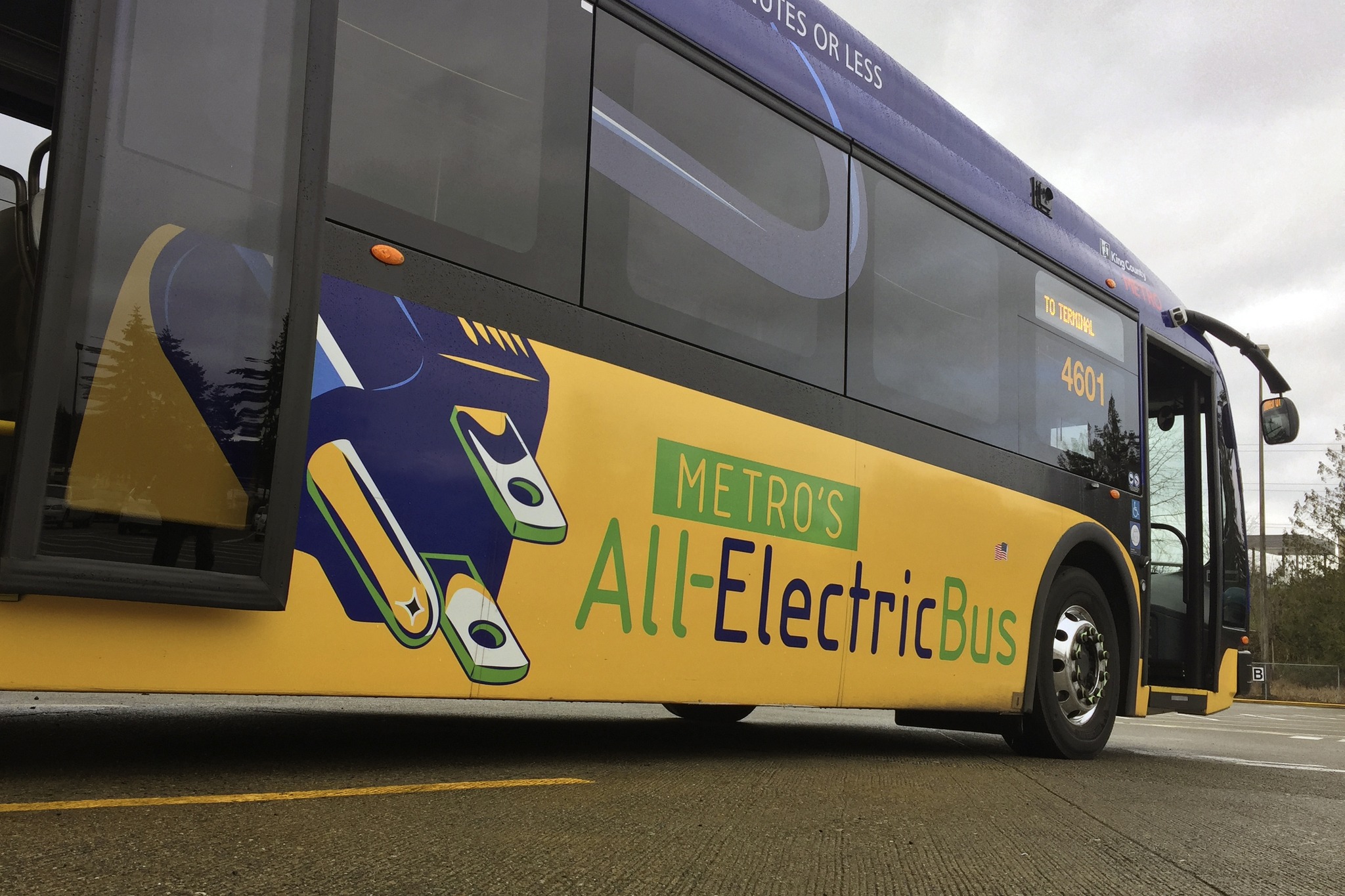These days, the prospect of effective climate action on the federal level looks very dim. But good news from the Left coast: King County keeps doing its part.
As Executive Dow Constantine announced Tuesday, the county will now acquire 120 all-electric, battery-powered buses to join King County Metro Transit’s fleet by 2020 — the largest such purchase by any operator in the nation. This puts the county on track to meet its goal of having a totally zero-emissions transit fleet, as it phases out diesel-powered buses in favor of rechargeable ones — which would be, at least in Seattle, rechargeable on electricity produced almost entirely by hydropower.
Right now, about 70 percent of the buses King County riders take are either all-electric trolleys (the ones connected to overhead wires) or hybrid-electric buses (which use both an electric battery and a diesel engine). The other 30 percent run on diesel alone, and get barely four miles to the gallon. That makes them “the bad, bad ones” in terms of carbon emissions, says King County Councilmember Rod Dembowski, chair of the Council’s Transportation, Economy and Environment Committee.
Dembowski sponsored a motion last spring that asked Metro to study the “feasibility of achieving a zero emissions or carbon-neutral bus and van pool fleet,” and Tuesday’s announcement is the culmination of that: After piloting a battery-bus program in Bellevue, and studying ways to deploy the vehicles equitably across the region, it is feasible, he says, and even cost-effective. While the up-front costs of battery buses are higher, “It costs less to operate battery buses and to maintain them” than it costs to maintain a hybrid-electric fleet. Gas prices won’t affect system costs, for instance. So, when you take into account all the other benefits, he argues, “It doesn’t cost more to do the right thing. It actually costs less.”
Sure, battery buses are better for the climate, Dembowski says, but they also produce public health benefits (diesel exhaust has a huge impact on air pollution), quality-of-life benefits (battery buses don’t throttle quiet residential streets with tons of noise and vibration the way diesel buses do), and city-maintenance cost benefits (battery buses are much lighter, so they don’t tear up city streets nearly as much).
This year, King County riders can expect routes 226 and 241 in the Bellevue area to to be fully electric, and, within a couple years, routes originating on the south end, too. Focusing on the south is strategic, Dembowski says: Air quality, and thus pollution-related health outcomes like asthma, is far worse in South Seattle.
The buses in the first round of purchases are manufactured by California-based company Proterra, and can run about 25 miles on a 10-minute charge. But King County is also, through this purchase and ongoing negotiations, pressing the EV industry to produce larger buses that run farther and longer on a single charge. That means that the purchase “is bigger than just King County,” says Dembowski. As one of the top-ten transit agencies in the country, “People look to us. What is King County Metro doing?… It’s pretty exciting actually. It is a big deal.”
The effort to green Metro’s fleet deserves a tip of the hat to Seattle City Councilmember Mike O’Brien, Dembowski adds, crediting O’Brien for helping inspire last spring’s County motion. O’Brien also sponsored a City Council resolution, passed in September, that promotes electric vehicles, too, by establishing another nation-leading environmental goal: 30 percent of all registered vehicles in Seattle will be electric by 2030. To help usher that in, Seattle plans to build 20 electric vehicle charging stations across the city and 150 more charging stations in the Seattle Municipal Tower to accomodate the City’s electric fleet. (ICYMI, O’Brien and Mayor Ed Murray made a charmingly awkward video promoting the resolution, in which they test drive a Nissan Leaf and badly sing “Baby You Can Drive My Car.” Worth a listen.)
Notably, King County’s battery-bus pilot program was first made possible by a federal grant. But lest anyone wonder whether a new federal administration, led by climate change-deniers, would be amenable to such funding in the future, Dembowski assures us that “this acquisition is not contingent on continued federal support.”
Nope, here in Washington state, we care about the climate. “We are committed to this, regardless of what [President-elect Donald] Trump and his anti-environment and anti-transit administration does.”








